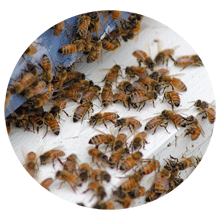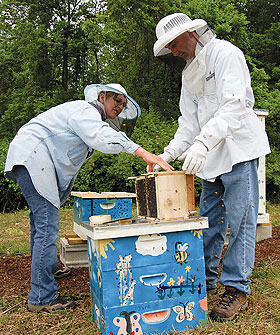  |
| HOME | THIS ISSUE | CALENDAR | GRANTS | BACK ISSUES | < BACK | NEXT > |
Beekeeping experiment aims to supply honey to dining halls by Richard Veilleux - June 23, 2008 | ||||
| Just weeks after a pair of employees in the Department of Dining Services began an experiment to raise bees that will produce honey for UConn’s dining halls, the brightly colored boxes that house the hives and 100,000 bees are buzzing with activity. The experiment is believed to be the first such effort at a college or university in the country. “They’re really moving fast,” says Steven Anthony, an assistant manager at North Campus dining hall. “They’ve almost completed building their combs on a couple of the frames [drawers that slide into each hive]. The activity in all 10 hives has been non-stop.” Standing near the hives in a freshly cut area of brush behind UConn’s old apple orchards, Anthony and Amy Gronus, who works in Northwest Dining Hall, answered questions from a television reporter, as thousands of bees buzzed behind them, moving in and out of the hives delivering their loads of nectar and going back out for more. News stories about the apiary have been carried in dozens of newspapers and on TV and radio since the bees arrived. “There really is a reason people refer to being ‘busy as a bee,’” Gronus tells the reporter. “They all have jobs to do and they never stop, morning to night.” Following the course, he talked to Gronus, who keeps several hives at her home in Ashford. Their discussions led to a successful proposal to UConn administrators. That should be good news to UConn students, who spoon nearly 1,000 pounds of honey into their tea and onto their toast every year. Chefs in the University’s nine dining halls use another 2,800 pounds of honey each year in marinades and sauces, and the UConn bakery also runs through honey rapidly.
Currently, the department buys some of its honey for Whitney Dining Hall from a local beekeeper, in keeping with a pledge to buy as much food as possible locally. The bulk of the honey is purchased from Sysco, one of the department’s primary vendors. The locally purchased honey costs roughly $5 to $6 per pound. That cost – about $10,000 to $15,000 annually – will decrease significantly, once the new hives are buzzing to capacity, says Anthony. The entire setup, including the hives, bees, queen bees, and equipment for handling the bees, cost only about $4,000, he says. And the labor involved, after the hives are built and the operation is set up, is minimal. It’s money well spent. “The flavor is so different (from store-bought honey). It’s stronger, more pure, when you harvest from your own hives,” says Gronus, who has kept several hives in her back yard for the past two years. “The flavor depends on what they eat, but it’s much better.” Once the bees start dining on ragweed in the fall, the honey will also take on a medicinal role, helping immunize the community against allergies. Gronus and Anthony say that because they got a late start this season – the bees were placed in the hives May 31, about two months later than ideal – they don’t expect to harvest more than about 500 pounds of honey in the fall. Beginning next year, however, they expect the hives to produce some 2,000 pounds of honey each year. That total could be greater if they add more hives. |
| ADVANCE HOME UCONN HOME |

 The idea of adding bees to UConn’s collection of productive farm animals came from Anthony, after he attended a Cooperative Education class on bees.
The idea of adding bees to UConn’s collection of productive farm animals came from Anthony, after he attended a Cooperative Education class on bees. 